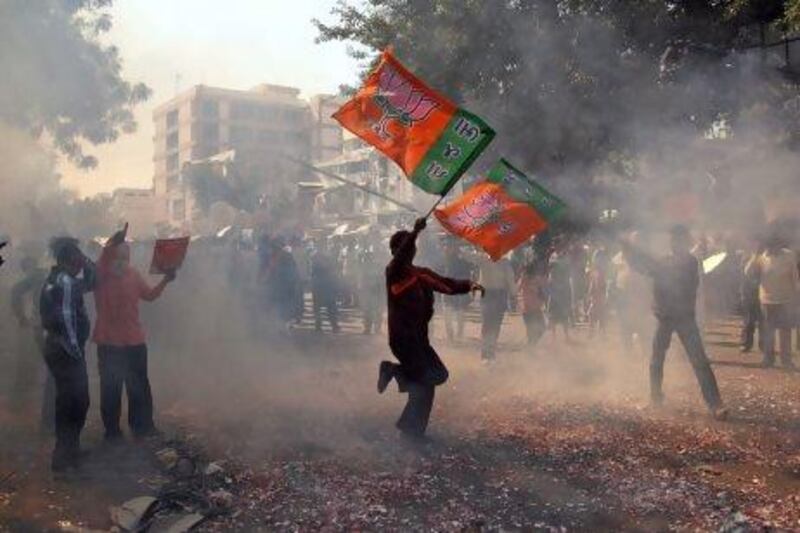NEW DELHI // The Hindu nationalist Bharatiya Janata Party (BJP) yesterday seized a third consecutive term in power in the state of Gujarat, boosting the political profile of Narendra Modi.
With nearly all of the votes counted, the BJP - led in the state by Mr Modi, a polarising figure many expect to run for prime minister in 2014 - won 115 out of 182 assembly seats, only two fewer than the 117 won in the last elections in 2007.
The Congress, the main opposition party in the state, won 60 seats.
Yesterday's results secured a fourth term for Mr Modi as Gujarat's chief minister. His leadership has been controversial: hailed in some quarters as a champion of economic progress but criticised by others for corroding Hindu-Muslim relations.
He is tainted by his inaction - and, some say, complicity - in religious riots in 2002 in which more than 1,000 people, mostly Muslims, died.
As BJP supporters danced in front of party offices holding signs calling for Mr Modi to take the country's top position, party officials dodged questions about his role in the next national elections. Mr Modi himself made clear he was thinking of the future. "No need of looking behind, FORWARD! We want infinite energy, infinite courage, infinite patience ..." he said on Twitter.
Mr Modi's trouncing of the Congress was "a major victory, even with the history of the riots under his belt", said Aruna Pendse, of the civics and politics department at the University of Mumbai.
"He was able to show that he has done good work there," Ms Pendse added.
It was not all bad news for the Congress yesterday. Results from November 4 elections in Himachal Pradesh were also announced, showing the party easily defeating the BJP there.
But the results from Gujarat earned the lion's share of the country's attention. Pundits debated whether holding the BJP to approximately the same number of seats was a small win for the Congress. P Chidambaram, India's finance minister and a Congress veteran, contended that his party had scored a moral victory. "The Congress has gained several seats, and the BJP has been contained," he told reporters in New Delhi, even though the Congress' won only one more seat in Gujarat than it did in 2007. "We have made significant gains. It's our victory."
However, Madhav Nalapat, a professor of geopolitics at Manipal University and a current affairs columnist, said the opposite was true.
"There are no real gains for the Congress," he told The National. "This is a fantastic win for the BJP."
"The Congress poured a lot of money into this election, but Narendra Modi was very thorough," Mr Nalapat added. "He really did his homework, and he really knows his region. He must have expected something in the 115-120 band, so he must be delighted."
While earlier campaigns highlighted Mr Modi's Hindu credentials, this year's avoided divisive issues. Gujarat has become a wealthy state over the past decade, a magnet for companies eager for business-friendly regulations. His campaign showcased his claims that he moulded Gujarat's transformation, bringing industries, jobs, electricity and water in a country where power outages and joblessness are epidemic.
Anil Bairwal, the national convener of a New Delhi-based non-profit, the Association for Democratic Reforms, said the BJP placed Mr Modi on a pedestal as "super-politician, and the results have not shown that".
"Modi's thing was that he was successfully able to dazzle people with whatever his propaganda was," Mr Bairwal said.
He pointed out that Mr Modi had merely appealed successfully to the Hindu voter in a state that is nearly 10 per cent Muslim, showing "that Modi's brand of Hindutva (Hindu nationalism) has worked".
Nancy Bamyan, 44, a homemaker in Ahmedabad, would not say which party she voted for, but said she voted with her children's future in mind - and she was not a fan of Mr Modi's record on education.
"My issues are my children and their education," Ms Bamyan said. "He should have done more for education in this state. The middle class cannot afford to send their children to private schools. Between (private school) fees and the sorry state of government schools, one has to say that I am not happy with this government."
Ms Pendse said she doubted Mr Modi's victory would lead to a candidacy for the premiership in the 2014 general elections, blaming his polarising nature.
"For the BJP to come to power in 2014, they know they will need partners to form a coalition, and it will be hard finding that kind of support for Modi. The BJP is more fractured along these lines than they let on."
sbhattacharya@thenational.ae
ssubramanian@thenational.ae





